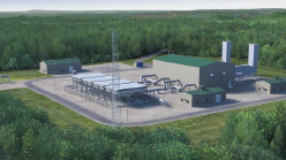The Natural Gas Council (Council) launched the Electric Generation Task Force (EGTF) in the fall of 1992 to respond to the dynamic, rapidly changing environment in which the electric and natural gas industries were operating. The Council envisioned the EGTF to be a forum where participants in the natural gas and electric utility industries could meet on a regional basis in an informal setting to improve the dialogue between their respective industries. A regional, rather than a national, perspective was taken, so that regional operational concerns could be focused on in greater detail.
After a number of preliminary meetings in 1992 and 1993, the EGTF became active with a series of regional meetings in 1994. Issues for discussion were identified in each region. Gas-electric industry participants in the Northeast region determined that they could build upon the work completed by the New England GasIElectric Discussion Group in establishing an ongoing clearing mechanism for information exchange.
Because the Midwest has been and continues to be heavily dependent upon coal-fired generation, there was still some "distrust" of natural gas as a reliable generating hel. Accordingly, the Midwest region determined that education between the natural gas and electric industries and of state regulators was essential.
The Southeast region is anticipating adding large amounts of gas-fired peaking capacity. In 1994, Southern Company alone was projecting the need to add an additional 8,000 MW of gas-fired peaking capacity. Through the meetings held in the Southeast, the electric and natural gas companies in this region were able to open up a dialogue and develop an understanding of how each industry operates and what communication is necessary to ensure the efficient and effective operation of both industries.
The Western region seemed to feel more comfortable with the inter-industry communications than other regions did. As a result, members of the Western region felt that the EGTF meetings provided them with the opportunity to krther this dialogue. In particular, the meetings proved to be an excellent opportunity to learn from each other’s experiences through case studies, and to discuss the emerging issues facing both the electric and natural gas industries.
Through the EGTF regional working groups, the Council has been able to accomplish its objective-to establish a forum where participants in the natural gas and electric utility industries could meet to discuss operational issues and changes occurring in each industry, and to work together to alleviate some of the problems that could result from these changes.
The most valuable benefit from the regional working group meetings is that a dialogue was established whereby the participants feel comfortable getting together to discuss those issues/concerns that are relevant to the operations of each industry. We feel confident that, to some degree, this dialogue will continue in order to meet the specific needs of each region.





